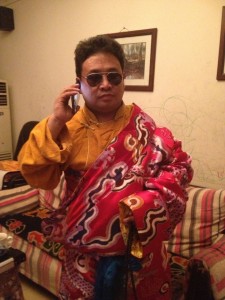
Two prominent members of the Tibetan folk music industry have been given harsh prison sentences and heavy fines for their involvement in the making of Tibetan folk music in Ngaba (Ch: Aba) County in Ngaba Tibetan and Qiang Autonomous Prefecture, Sichuan Province, according to sources in Tibet.
On 27 November, well-known folk singer and music producer Pema Rigzin and famed singer Kelsang Yarphel were sentenced together to lengthy prison sentences and given severe fines by the Intermediate People’s Court in Chengdu, Sichuan Province.
Pema Rigzin, 44, was sentenced to two and a half years in prison and a severe fine of 50,000 yuan for composing, releasing, and distributing music with alleged political overtones. Rigzin was detained on 7 May 2013 in Chengdu city, and held incommunicado until the 27 November trial. Though family members were allowed to attend the trial, they were barred by authorities from hiring Rigzin a lawyer. Born in nomadic camp no. 4 of Meuruma Village in Ngaba County, Rigzin entered the local Namtso Monastery as a child and continued his studies at the Larung Gar Buddhist Institute in neighboring Serta County. Rigzin began his singing career in 1982 and became famous for songs such as “Tears” and “Remembrance Song for Snowland.” In 2008, he cut short his singing career in order to establish a recording studio in Chengdu, where he focused on producing other Tibetan singers’ records and DVDs, including those of Kelsang Yarphel, with whom he was recently sentenced. TCHRD sources report that he was on numerous occasions pressured by authorities to shut down his studio.
Rigzin, whose parents are deceased, is married to Tashi Choedon, and has two sons and a daughter. Kelsang Yarphel, 39, another prominent Tibetan singer, was sentenced alongside Pema Rigzin on 27 November. Accused of unknown charges, he was sentenced to four years in prison and given an immense 200,000 Yuan fine. As reported by TCHRD, Kelsang Yarphel was detained by authorities in Lhasa on 14 July 2013 on charges that he performed a song with alleged political overtones at a concert there. Following his arrest, he was held in a detention center in Chengdu for a period of one and a half years.

Yarphel was born in Makhug Tara Village of Machu County in Kanlho (Ch: Gannan) Tibetan Autonomous Prefecture, Gansu Province. He is a popular folk singer and composer of well-known songs such as “The Homeland of the Gesar of Ling,” “Modern Tibetans,” and “Dragon’s Thunder Welcomes the Spring.” He has performed frequently at government and private concerts, and organized other Tibetan musical events, such as a musical celebration of Losar aired on Tibetan language TV in Qinghai Province. Though some of Yarphel’s music encouraged Tibetan unity, none has been known to express political ideology. Kelsang Yarphel, son of Gonpo Tseten and Makho, is husband to Tsezin Palmo, and has two sons, Ogyen Kyab, 22, Konchok Tenpa, 20, and a daughter, Dolkar Lhamo, 19.
“We condemn the 27 November sentencing of Pema Rigzin and Kelsang Yarphel. As Rigzin and Yarphel are two artists peacefully exercising their human right to freedom of expression and contributing to the cultural heritage of Tibet, there can be no legitimate grounds for such sentencing and fines, said Tsering Tsomo, executive director of TCHRD. “We further condemn the arbitrary arrest and long arbitrary detentions to which both artists have been subjected.”
China, as a signatory to the International Covenant on Civil and Political Rights, is obliged to refrain in good faith from any act that defeats the object of the Covenant, including violations of Article 19(2), which ensures the right to freedom of expression. TCHRD strongly urges therefore the reversal of the decision of the Intermediate People’s Court in Chengdu, and the immediate release of Pema Rigzin and Kelsang Yarphel.
